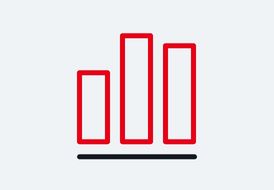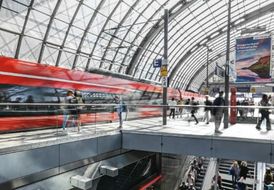Global Reporting Initiative (GRI) Index
| Statement of use | DB Group has reported in accordance with the GRI Standards for the period from January 1, 2022 to December 31, 2022. |
GRI 1 used | GRI 1: Foundation 2021 |
| Applicable GRI Sector Standard(s) | None |
GRI Standard | Page(s) | Omission | ||
| Requirement(s) omitted | Reason | Explanation | ||
General disclosures | ||||
| GRI 2: GENERAL DISCLOSURES 2021 | ||||
| 1. THE ORGANIZATION AND ITS REPORTING PRACTICES | ||||
2-1 Organizational details | ||||
2-2 Entities included in the organization’s sustainability reporting | Sustainability reporting, Basic principles and methods, (42) List of shareholdings | |||
2-3 Reporting period, frequency and contact point | ||||
2-4 Restatements of information | Sustainability reporting, Comparability with the previous year, Comparability with the previous year (Notes to the consolidated financial statements) | |||
2-5 External assurance | Report of the Supervisory Board, Sustainability reporting, Independent Auditor's Report | |||
| 2. ACTIVITIES AND WORKERS | ||||
2-6 Activities, value chain and other business relationships | Organizational structure, Business model, Procurement, Markets and strategy DB Long-Distance, Business model DB Long-Distance, Markets and strategy DB Regional, Business model DB Regional, Markets and strategy DB Cargo, Business model DB Cargo, Markets and strategy DB Netze Track, Business model DB Netze Track, Markets and strategy DB Netze Stations, Business model DB Netze Stations, Markets and strategy DB Netze Energy, Business model DB Netze Energy, Markets and strategy DB Arriva, Business model DB Arriva, Markets and strategy DB Schenker, Business model DB Schenker, Compliance, Human rights, Consolidated balance sheet, Scope of consolidation and investements in other companies | |||
2-7 Employees | Employee numbers and structure, Work-life balance, Development in the year under review DB Long-Distance, Development in the year under review DB Regional, Development in the year under review DB Cargo, Development in the year under review DB Netze Track, Development in the year under review DB Netze Stations, Development in the year under review DB Netze Energy, Development in the year under review DB Arriva, Development in the year under review DB Schenker | b. iii | Information unavailable/ incomplete | Not all companies outside of Germany have a central data warehouse to consolidate and process the individual data from the different companies. |
2-8 Workers who are not employees | – | a., b., c. | Information unavailable/ incomplete | Not all companies outside of Germany have a central data warehouse to consolidate and process the individual data from the different companies. |
| 3. GOVERNANCE | ||||
2-9 Governance structure and composition | Organizational structure, Cooperation between the Management Board and the Supervisory Board | |||
2-10 Nomination and selection of the highest governance body | Cooperation between the Management Board and the Supervisory Board | |||
2-11 Chair of the highest governance body | Cooperation between the Management Board and the Supervisory Board | |||
2-12 Role of the highest governance body in overseeing the management of impacts | ||||
2-13 Delegation of responsibility for managing impacts | Sustainability management, Cooperation between the Management Board and the Supervisory Board | |||
2-14 Role of the highest governance body in sustainability reporting | a. | Information unavailable/ incomplete | A more detailed description of the procedure for review and approval is planned for future reporting years. | |
2-15 Conflicts of interest | Cooperation between the Management Board and the Supervisory Board | |||
2-16 Communication of critical concerns | ||||
2-17 Collective knowledge of the highest governance body | – | a. | Information unavailable/ incomplete | Questions of long-term training for Supervisory Board members, in particular on sustainability issues, will be included in the upcoming efficiency audit in 2023. |
2-18 Evaluation of the performance of the highest governance body | Compensation report | |||
2-19 Remuneration policies | ||||
2-20 Process to determine remuneration | Compensation report | |||
2-21 Annual total compensation ratio | – | a., b., c. | Information unavailable/ incomplete | Not all companies outside of Germany have a central data warehouse to consolidate and process the individual data from the different companies. |
| 4. STRATEGY, POLICIES AND PRACTICES | ||||
2-22 Statement on sustainable development strategy | ||||
2-23 Policy commitments | Procurement, Environmental management (Opportunity and risk report), Regulations in DB Group, Compliance, Human rights | |||
2-24 Embedding policy commitments | Procurement, Regelwerk im DB-Konzern, Compliance, Human rights | |||
2-25 Processes to remediate negative impacts | Sustainability in the supply chain, Compliance, Human rights | a. | Information unavailable/ incomplete | There are currently no comprehensive commitments to remedy this situation. Through the policy declaration of the LKSG, there will be a commitment to remedy human rights and environmental obligations in 2023. |
2-26 Mechanisms for seeking advice and raising concerns | ||||
2-27 Compliance with laws and regulations | a., b. | Information unavailable/ incomplete | Information system not yet available. In development. | |
2-28 Membership associations | Dialog with policymakers and the public, Memberships in sustainability networks | |||
| 5. STAKEHOLDER ENGAGEMENT | ||||
2-29 Approach to stakeholder engagement | ||||
2-30 Collective bargaining agreements | a., b. | Information unavailable/ incomplete | Not all companies outside of Germany have a central data warehouse to consolidate and process the individual data from the different companies. | |
GRI Standard | Page(s) | Omission | ||
| Requirement(s) omitted | Reason | Explanation | ||
Material topics | ||||
| GRI 3: MATERIAL TOPICS 2021 | ||||
3-1 Process to determine material topics | Overview of the stakeholder dialog, Selection of sustainability topics | |||
3-2 List of material topics | Selection of sustainability topics | |||
| Economic performance capability | ||||
3-3 Management of material topics | Open stakeholder dialog, Strong Rail, Financial position, Key economic performance indicators, Asset situation, Outlook | |||
| GRI 201: ECONOMIC PERFORMANCE 2016 | ||||
201-1 Direct economic value generated and distributed | Income development, Consolidated statement of income, Consolidated statement of changes in equity | |||
201-2 Financial implications and other risks and opportunities due to climate change | a. v. | Information unavailable/ incomplete | Costs for managing climate-related opportunities and risks are set out in various items of the statement of income in the reporting. However, they have not yet been combined under this aspect. | |
201-3 Defined benefit plan obligations and other retirement plans | ||||
201-4 Financial assistance received from governmen | Covid-19 pandemic, Development of business environment, Capital expenditures, Development in the relevant markets DB Arriva, (38) Related-party disclosures | |||
| GRI 203: INDIRECT ECONOMIC IMPACTS 2016 | ||||
203-1 Infrastructure investments and | Capital expenditures, Infrastructure financing (Opportunity and risk report), (37) Infrastructure and transport contracts | |||
203-2 Significant indirect economic impacts | Strong Rail | |||
| Corporate management and compliance | ||||
3-3 Management of material topics | Compliance | |||
| GRI 205: ANTI-CORRUPTION 2016 | ||||
205-1 Operations assessed for risks related to corruption | Risik management (Non-financial statement), Opportunity and risk management within DB Group, Compliance instruments | a. | Information unavailable/ incomplete | Quantitative survey in accordance with requirements is not material from DB Group perspective and therefore undue. Within a three-year cycle, all Group companies with operating activities are to be examined for risks of corruption. Compliance risks must be reported annually on business units level. |
205-2 Communication and training about anti-corruption policies and procedures | Sustainability in the supply chain, Compliance instruments, Compliance business partners | a., b., c., d., e. | Information unavailable/ incomplete | Quantitative survey in accordance with requirements is not material from DB Group perspective and therefore undue. Communication and training on anti-corruption are described under “Compliance instruments”. Upon conclusion of the contract, suppliers are informed of and obliged to meet anticorruption requirements. |
205-3 Confirmed incidents of corruption and actions taken | ||||
GRI 206: ANTI-COMPETITIVE BEHAVIOR 2016 | ||||
206-1 Legal proceedings due to anti-competitive behavior, anti-trust and monopoly practices | – | a. | Information unavailable/ incomplete | The total number is currently not available and will be reported in the future. |
b. | Not applicable | No completed proceedings during the reporting period. | ||
| Sustainable resource use | ||||
3-3 Management of material topics | Management approach and targets resource conservation, Environmental management (Opportunity and risk report) | |||
GRI 301: MATERIALS 2016 | ||||
301-1 Materials used by weight or volume | Management approach and targets resource conservation, Resource conservation | a. | Information unavailable/ incomplete | According to the material flow analysis conducted in 2021, the materials used in track infrastructure (rail steel, gravel, concrete ties) are the main resources of DB Group. The materiality of additional resources is checked continuously. |
301-2 Recycled input materials used | Management approach and targets resource conservation, Resource conservation | a. | Information unavailable/ incomplete | According to the material flow analysis conducted in 2021, the materials used in track infrastructure (rail steel, gravel, concrete ties) are the main resources of DB Group. The materiality of additional resources is checked continuously. |
301-3 Reclaimed products and their packaging materials | Management approach and targets resource conservation, Resource conservation | a. | Information unavailable/ incomplete | According to the material flow analysis conducted in 2021, the materials used in track infrastructure (rail steel, gravel, concrete ties) are the main resources of DB Group. The materiality of additional resources is checked continuously. |
GRI 306: WASTE 2020 | ||||
306-1 Waste generated and significant waste-related impacts | ||||
306-2 Management of significant waste-related impacts | Management approach and targets resource conservation, Waste management | |||
306-3 Waste generated | Waste management | |||
306-4 Waste diverted from disposal | b., c. | Information unavailable/ incomplete | The data on “Preparation for reuse” is not collected by | |
306-5 Waste directed to disposal | b., c. | Information unavailable/ incomplete | Excluding DB Arriva. DB Cargo AG is the only part of the DB Cargo business unit included. The extent to which the data can be collected in the medium term is being examined. | |
| Climate protection | ||||
3-3 Management of material topics | Climate protection, Development in the year under review DB Long-Distance, Environmental measures DB Long-Distance, Development in the year under review DB Regional, Environmental measures DB Regional, Development in the year under review DB Cargo, Environmental measures DB Cargo, Environmental measures DB Netze Track, Development in the year under review DB Netze Stations, Environmental measures DB Netze Stations, Development in the year under review DB Netze Energy, Environmental measures DB Netze Energie, Development in the year under review DB Arriva, Environmental measures DB Arriva, Development in the year under review DB Schenker, Environmental measures DB Schenker, Climate-related opportunities and risks | |||
GRI 305: EmissionS 2016 | ||||
305-1 Direct (Scope 1) GHG emissions | c. | Information unavailable/ incomplete | In the context of the Scope 3.3 emissions that are currently not reported in accordance with the GHG protocol, accounting for biogenic CO₂ emissions does not make sense. The aim is to expand in the medium term. | |
d. | Not applicable | No separate scope targets are stated in the Group climate protection target for the base year 2006. | ||
305-2 Energy indirect (Scope 2) GHG emissions | Management approach and climate protection target, Overview of greenhouse gas footprint, Methodology | |||
305-3 Other indirect (Scope 3) GHG emissions | Management approach and climate protection target, Overview of greenhouse gas footprint, Methodology | c. | Information unavailable/ incomplete | In the context of the Scope 3.3 emissions that are currently not reported in accordance with the GHG protocol, accounting for biogenic CO₂ emissions does not make sense. The aim is to expand in the medium term. |
305-4 GHG emissions intensity | Greenhouse gas intensity, Overview of greenhouse gas footprint, Methodology | |||
305-5 Reduction of GHG emissions | Management approach and climate protection target, Greenhouse gas intensity, Overview of greenhouse gas footprint, Methodology | a. | Information unavailable/ incomplete | No quantitative information is available at the time of data collection. In addition to qualitative data, quantitative data is also being reported in the medium term. |
305-6 Emissions of ozone-depleting substances (ODS) | a., b., c., d. | Not applicable | If used, refrigerants are used in such small quantities that materiality is not given. | |
305-7 Nitrogen oxides (NOx), sulfur oxides (SOx) and other significant air emissions | ||||
GRI 302: ENERGY 2016 | ||||
302-1 Energy consumption within the organization | b., c., d. | Information unavailable/ incomplete | Total fuel consumption is reported, but the fuel types used cannot be broken down at present. A breakdown by fuel type is only available for the DB traction current mix. Further information will be reported in the medium term. | |
302-2 Energy consumption outside the organization | a. | Information unavailable/ incomplete | The primary energy consumption reported includes the energy consumption of the main Scope 3.4 transport services in accordance with the GHG Protocol (DB Schenker, DB Regional Bus, rail freight transport to China). Additional Scope 3 categories are specified in the medium term. | |
302-3 Energy intensity | Energy efficiency | |||
302-4 Reduction of energy consumption | Management approach and climate protection target, Energy efficiency, Methodology | a., b., c. | Information unavailable/ incomplete | No quantitative information is available at the time of data collection. In addition to qualitative data, quantitative data is also being reported in the medium term. |
302-5 Reductions in energy requirements of products and services | Management approach and climate protection target, Energy efficiency, Methodology | |||
| Customer safety | ||||
3-3 Management of material topics | ||||
GRI 410: SECURITY PRACTICES 2016 | ||||
410-1 Security personnel trained in human rights policies or procedures | Group Security | |||
GRI 416: CUSTOMER HEALTH AND SAFETY 2016 | ||||
416-1 Assessment of the health and safety impacts of product and service categories | – | a. | Information unavailable/ incomplete | Information cannot currently be reported due to the complex business structure. |
416-2 Incidents of non-compliance concerning the health and safety impacts of products and services | – | a., b. | Information unavailable/ incomplete | Information cannot currently be reported due to the complex business structure. |
| Capacity expansion of the infrastructure and vehicle fleet | ||||
3-3 Management of material topics | Implementing Strong Rail, Infrastructure expansion, Fleet and depot expansion | |||
GRI 413: LOCAL COMMUNITIES 2016 | ||||
413-1 Operations with local community engagement, impact | – | a. | Information unavailable/ incomplete | Percentage can currently not be represented due to the complex Group structure and extensive infrastructure. |
413-2 Operations with significant actual and potential negative impacts on local communities | – | a. | Information unavailable/ incomplete | Information can currently not be represented due to the complex Group structure and extensive infrastructure. |
| Dealing with politics and regulations | ||||
3-3 Management of material topics | Dialog with policymakers and the public, Development of business environment, Legal topics, General framework DB Netze Track, General framework DB Netze Stations, General framework DB Netze Energy, Regulation (Opportunity and risk report), Introduction of the Germany-Ticket, Infrastructure Acceleration Act | |||
GRI 415: PUBLIC POLICY 2016 | ||||
415-1 Political contributions | Dialog with policymakers and the public | a., b. | Not applicable | Contributions of any kind to political parties, their representatives, political leaders, elected representatives and candidates for political office are generally prohibited. |
| Solutions for modern and digital mobility, logistics and service | ||||
3-3 Management of material topics | Management approach and targets digitalization, Ecosystems and partnerships, Digital transformation, Information security | |||
| Customer benefit and product quality | ||||
3-3 Management of material topics | Overview of key figures (rail in Germany), The customer is at the center of our actions, Management approach and targets, Customer satisfaction, Punctuality | |||


